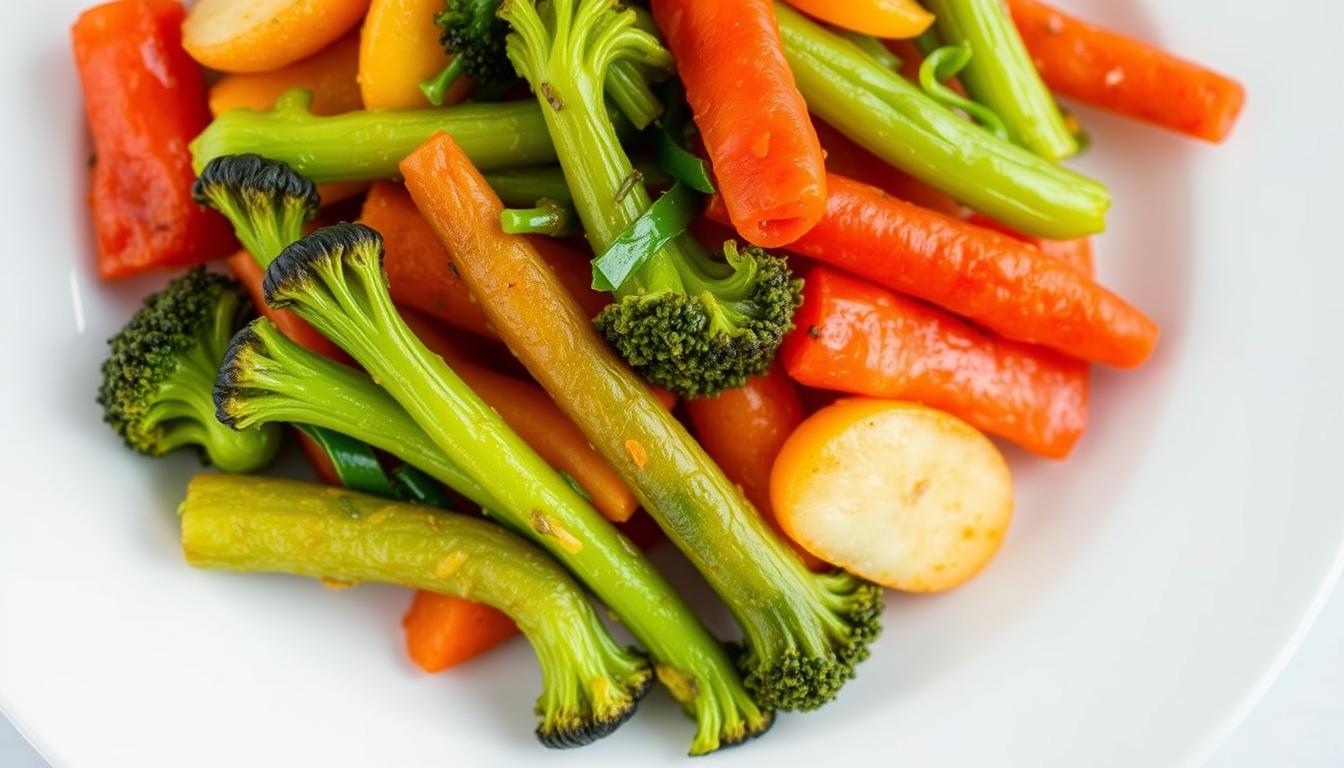Ever felt tired, slow, and needed a natural energy boost? I did. Years of eating processed foods left me looking for a real health change.
Vegetable juice became my surprise ally. It’s not just a health trend. It’s a proven way to boost your health. It packs the most nutrients from veggies into one drink.
Starting your health journey with vegetable juice is key. It lets you get lots of nutrients from veggies in one glass. This adrink boosts your energy and health.
In this guide, we’ll explore vegetable juice’s benefits. You’ll see it’s not just a trend. It’s a powerful way to keep your body running well. Get ready to feel full of energy and life.
Table of Contents
Understanding the Power of Fresh Vegetable Juice
Explore the world of fresh vegetable juice and see how it can boost your health. Unlike whole veggies, juicing packs a punch of nutrients. It’s a quick way to get the good stuff into your body.
What Sets Vegetable Juice Apart
Fresh vegetable juice is a special way to get nutrients. It’s different from eating whole veggies. Your body can quickly soak up vitamins and minerals without much work.
- Faster nutrient uptake compared to whole vegetables
- Concentrated nutritional components
- Easier digestibility
- Reduced fiber content for quicker assimilation
Key Nutritional Components
The nutrients in vegetable juice are very strong. A single glass can give you a lot of what you need for the day.
| Nutrient | Benefit | Key Sources |
|---|---|---|
| Vitamin C | Immune Support | Leafy Greens, Citrus |
| Potassium | Heart Health | Beets, Carrots |
| Antioxidants | Cellular Protection | Dark Leafy Vegetables |
The Science of Juice Absorption
Juice absorption is quicker than digesting whole veggies. Without fiber, your body can get to the nutrients fast. This makes fresh vegetable juice a great way to get nutrients.
*”Drinking your vegetables can sometimes be more beneficial than eating them whole.”* – Nutrition Research Institute
A 2022 study in the Journal of Nutritional Science found juice benefits. It showed lower blood pressure and better nutrient intake with vegetable juice.
Health Benefits of Daily Vegetable Juice Consumption

Adding daily vegetable juice to your routine can transform your health. Fresh vegetable juice is packed with nutrients that your body absorbs quickly. You’ll see benefits in just 10 to 15 minutes.
“Nutrition is the foundation of health, and vegetable juice is a fast track to wellness.”
Vegetable juice does more than just provide basic nutrition. Studies show that eating more vegetables can cut chronic disease risks by up to 30%.
- Boosts energy levels naturally
- Supports immune system function
- Improves digestive health
- Helps manage weight effectively
Your daily vegetable juice can fill nutritional gaps in processed foods. It’s packed with amino acids, minerals, enzymes, and vitamins. This makes it a great way to get the nutrients you need.
Vegetable juice can also help with weight management. Research shows it can lead to a 7% body weight loss in three months.
Pro tip: Mix different vegetables like cucumber, carrot, and beet for a comprehensive nutritional profile.
By making vegetable juice a daily habit, you’re investing in your health. It supports heart function and helps with cellular regeneration.
Essential Nutrients Found in Vegetable Juice
Vegetable juice is a nutritional powerhouse. It gives your body a concentrated dose of nutrients. Sadly, only a few adults eat enough fruits and veggies. Juice is a great way to fill this nutritional gap.
Explore the amazing vitamins, minerals, and antioxidants in every glass of vegetable juice.
Vitamin Powerhouse
Your daily vegetable juice is packed with essential vitamins. Studies from the Journal of the American Nutrition Association show juice boosts blood levels of important nutrients:
- Vitamin A: Supports eye health and immune function
- Vitamin C: Boosts immune system and skin health
- Vitamin K: Promotes bone strength and blood clotting
Mineral Magic
Vegetable juice also gives you vital minerals for your body’s health:
- Iron: Supports oxygen transport in blood
- Potassium: Helps regulate heart and muscle function
- Magnesium: Aids in energy production and muscle recovery
Antioxidant Protection
Antioxidants in vegetable juice protect your cells from damage. These powerful compounds help reduce inflammation and support overall cellular health.
“Every glass of vegetable juice is like a shield for your body’s cells” – Nutrition Expert
Enzyme Advantages
Fresh vegetable juice has live enzymes that aid digestion and nutrient absorption. Cold-pressed methods keep more nutrients than traditional juicing. This means you get the most nutritional benefits.
Adding vegetable juice to your diet is a smart choice for better nutrition and wellness.
The Best Green Vegetables for Juicing

Green vegetables are packed with nutrients for juicing. They can boost your health in amazing ways. Adding them to your diet can change your nutrition for the better.
Choosing the right green vegetables is key. Dark leafy greens are the most nutritious. They have vitamins, minerals, and antioxidants that are good for you.
- Kale: A nutrient-dense superfood with high levels of vitamins A, K, and C
- Spinach: Rich in iron and essential minerals
- Swiss Chard: Provides robust antioxidant protection
- Romaine Lettuce: Offers excellent hydration and vitamin K
Studies show darker greens have more antioxidants than lighter ones. These greens help your body detox and improve your health.
“Incorporating green vegetable juices can significantly enhance your daily nutrient intake.” – Nutrition Expert
| Green Vegetable | Key Nutrients | Health Benefits |
|---|---|---|
| Kale | Vitamins A, K, C | Supports immune system |
| Spinach | Iron, Calcium | Improves blood health |
| Swiss Chard | Magnesium, Potassium | Reduces inflammation |
When making your green juice, mix flavors and nutrients. Use different greens for a tasty and healthy drink. It will help you reach your health goals.
Pro tip: Start with milder greens like romaine and gradually introduce more intense flavors like kale to develop your palate.
Root Vegetables and Their Juicing Benefits
Root vegetables are full of nutrients and can change your juicing game. They are packed with vitamins and minerals, making them great for juicing. Carrots, beets, and ginger each offer unique health benefits.
Exploring root vegetable juices can bring amazing health perks. Let’s look at the amazing qualities of some top root vegetables. They can boost your nutrition big time.
Carrot Juice: A Nutrient-Dense Elixir
Carrot juice is a nutritional superstar. It’s full of beta-carotene, which helps:
- Improve eye health
- Boost the immune system
- Regenerate skin cells
Beet Juice: Detoxification Champion
Beet juice is a detox powerhouse. It’s loaded with betalains that help:
- Detox the body
- Reduce inflammation
- Keep the heart healthy
Ginger Root: The Spicy Health Booster
Ginger root adds a zesty kick to your juice. It’s packed with health benefits like:
- Boosting digestion
- Lowering inflammation
- Strengthening the immune system
“Juicing root vegetables is like unleashing a natural pharmacy in your kitchen.” – Nutrition Expert
| Root Vegetable | Key Nutrient | Primary Health Benefit |
|---|---|---|
| Carrot | Beta-carotene | Eye & Immune Health |
| Beet | Betalains | Detoxification |
| Ginger | Gingerols | Anti-Inflammatory |
Adding these root vegetables to your juicing routine makes delicious, healthy drinks. Try carrot, beet, and ginger juices to find your favorite mix!
Vegetable Juice Combinations for Maximum Benefits
Making the perfect vegetable juice is like an art. It turns healthy food into tasty wellness. By mixing different veggies, you can make juices that taste great and are good for you.
Here are some top vegetable juice combinations:
- Immunity Booster: Carrot + Ginger + Kale
- It has 1,000% more Vitamin C than spinach
- Ginger adds 12 antioxidants
- Energy Enhancer: Beet + Pineapple + Spinach
- Beets boost stamina with natural nitrates
- Pineapple’s bromelain helps recover faster
- Skin Health: Cucumber + Celery + Apple
“Juicing lets you eat more veggies than usual, getting more nutrients.” – Nutrition Experts
Here are some tips for making amazing vegetable juices:
- Always mix fruits with veggies to avoid blood sugar spikes
- Use only fresh, raw ingredients
- Try out different vegetable juice mixes
The secret to great juices is finding the right balance. Start small, taste as you go, and feel free to experiment with your vegetable juice mixes!
How to Prepare the Perfect Vegetable Juice
Making tasty and healthy vegetable juice is more than just blending ingredients. Knowing the right ways to prepare it can greatly improve your health and cooking skills.
Choosing the Right Juicing Equipment
Choosing the right juicer is key to getting the most nutrients. Think about these important points when picking your juicer:
- Masticating juicers for slow, thorough nutrient extraction
- Centrifugal juicers for quick processing
- Cold press juicers for preserving enzymatic content
Step-by-Step Preparation Process
To make great vegetable juice, follow these important steps:
- Wash vegetables well to get rid of dirt and pesticides
- Chop produce into smaller pieces for easier juicing
- Remove hard stems and woody parts
- Mix different vegetables for balanced nutrition
Optimal Juice Storage Techniques
Storing juice right is key to keeping its nutrients. Use these methods to keep your juice fresh:
- Store in airtight glass containers
- Refrigerate immediately after juicing
- Drink within 24-48 hours for best nutrient retention
“Fresh juice is a powerful nutrient delivery system when prepared and stored correctly.” – Nutrition Expert
By using these tips, you’ll make vegetable juices full of nutrients. They will help boost your health and well-being.
Common Mistakes to Avoid When Juicing
Starting with juicing can be thrilling, but beginners often make mistakes. These errors can harm your health goals. Knowing these mistakes helps you make better vegetable juices.
“Not all juice is created equal. Smart juicing requires knowledge and careful preparation.”
Managing sugar is crucial. Too many fruits can make your juice too sweet. This can raise your blood sugar too high. In fact, some juices have as much sugar as a soda.
- Maintain a 3:1 vegetable-to-fruit ratio
- Use low-sugar vegetables like cucumbers and leafy greens
- Incorporate natural sweeteners like carrots or beets sparingly
Don’t forget to keep your juicer clean. Old juicers can lose nutrients due to heat. Clean it well after each use to avoid bacteria and keep it working right.
| Juicing Mistake | Recommended Solution |
|---|---|
| Excessive fruit content | Limit fruits, focus on vegetables |
| Inconsistent cleaning | Clean juicer immediately after use |
| Repetitive ingredients | Rotate vegetables for diverse nutrients |
Juicing should add to your diet, not replace it. Cold-press juices are easier to digest but lack whole foods’ fiber. See juicing as a supplement, not a meal by itself.
The Truth About Store-Bought vs. Homemade Vegetable Juice
Vegetable juice can be a great way to boost your nutrition. But, not all juices are the same. Knowing the difference between store-bought and homemade can help you choose better for your health.
Nutritional Differences That Matter
Homemade vegetable juice has big nutritional benefits over store-bought. Commercial juices often lose important nutrients during processing. The FDA says store-bought juice can be only 10-99% real juice, mixed with additives and sweeteners.
- Homemade juice keeps more live enzymes
- Fresh juices have more vitamins
- No artificial preservatives or added sugars
Cost Comparison
Homemade juice might seem more expensive at first, but it’s actually cheaper in the long run. Brands like Raw Generation offer discounts, but making your own juice saves money.
Convenience Factors
Store-bought juice is easier to get. Brands like Suja Organic have juices that last up to 5 days. But, making your own juice means you get freshness and control over what goes in it.
“The best nutrition comes from juice you make yourself” – Nutrition Experts
Your choice between store-bought and homemade juice should be about more than taste. Homemade juice lets you control your health journey better than store-bought options.
Incorporating Vegetable Juice into Your Daily Diet
Adding daily vegetable juice to your diet can change your nutrition game. It’s a simple way to boost your health. By making fresh vegetable juice a part of your routine, you’ll see big improvements in your wellness.
First, learn how to make vegetable juice a daily habit. Here are some easy tips to help you drink more juice:
- Drink your daily vegetable juice in the morning on an empty stomach
- Replace one meal or snack with a nutrient-packed juice
- Prepare juice in advance for quick consumption
- Experiment with different vegetable combinations
“Nutrition is not about being perfect. It’s about eating food that makes you feel great.” – Unknown
Here are some smart ways to drink your juice:
| Juice Type | Best Time | Nutritional Impact |
|---|---|---|
| Green Vegetable Juice | Morning | Energy Boost |
| Root Vegetable Juice | Pre-Workout | Performance Enhancement |
| Mixed Vegetable Juice | Afternoon | Nutrient Replenishment |
It’s important to keep things balanced. Your vegetable juice should add to your diet, not replace it. Try to have a 3:1 ratio of veggies to fruits to avoid too much sugar.
Pro tip: Always use fresh, organic vegetables and drink your juice within 24-48 hours for the best nutrition.
Potential Side Effects and Precautions
Adding vegetable juice to your diet can be great, but knowing the potential side effects is key. Vegetable juices are packed with nutrients, but they can also cause issues for some people.
Here are some important juicing precautions to keep in mind:
- Start with small amounts to let your body adjust
- Watch how your body reacts to different juices
- Talk to a doctor if you have health issues
- Don’t use juice as your only meal
Some possible side effects of vegetable juice include:
- Digestive discomfort – Changing your diet can cause bloating or gas
- Blood sugar changes – Some juices might affect your insulin levels
- Nutrient imbalances – Drinking too much juice can lead to too many minerals
“Moderation is key when introducing vegetable juices into your nutrition plan.” – Nutrition Expert
| Vegetable Type | Potential Side Effects | Recommended Precautions |
|---|---|---|
| High Oxalate Vegetables | Kidney Stone Risk | Limit intake, balance with other vegetables |
| Cruciferous Vegetables | Thyroid Function Interference | Rotate vegetable choices, avoid excessive consumption |
| Root Vegetables | Blood Sugar Spikes | Mix with low-sugar green vegetables |
Knowing about vegetable juice side effects and juicing precautions helps you enjoy their benefits safely. Always pay attention to how your body reacts and make smart choices about what you eat.
Best Times to Drink Vegetable Juice
Knowing the best time to drink vegetable juice can really boost your health. It’s not just a drink; it’s a tool for better health. Drinking it at the right times can make it even more effective.
Figuring out when to drink vegetable juice depends on your health goals and daily life. Choosing the right time can change how you approach nutrition.
Morning Nutritional Boost
Starting your day with vegetable juice can give you a big energy boost. Drinking it in the morning helps you:
- Get nutrients quickly
- Feel energized without caffeine
- Stay hydrated after sleeping
Pre and Post Workout Strategies
Timing your juice around workouts can really help your fitness. Here are some tips for when to drink vegetable juice:
| Workout Phase | Juice Recommendation |
|---|---|
| Pre-Workout | Light, easy-to-digest green juice 30-45 minutes before exercise |
| Post-Workout | Nutrient-rich juice within 30 minutes to help muscles recover |
Evening Juice Considerations
Drinking vegetable juice in the evening can be good, but choose wisely. Go for juices that are low in sugar and high in minerals. They won’t mess up your sleep.
“Juice timing is as crucial as juice content—choose wisely for maximum health benefits.”
By knowing when to drink vegetable juice, you can turn it into a key part of your nutrition plan. It’s all about matching it to your body’s needs.
The Role of Vegetable Juice in Weight Management
Vegetable juice can be a great help in losing weight. It’s a smart choice for a diet that keeps you full of nutrients. Unlike quick fixes, it’s a lasting way to eat well.
Your body loves the low calories and lots of nutrients in vegetable juices. Green vegetable juices are top picks. They have just 14 calories and lots of antioxidants to fight inflammation.
“Juicing is not a magic solution, but a strategic tool in your weight management toolkit.”
Vegetable juice offers many benefits for managing weight:
- Low caloric content
- High nutrient density
- Enhanced hydration
- Increased feeling of fullness
Some great veggies for your weight loss juice diet are:
- Celery: 95% water, extremely low in calories
- Beetroot: Promotes feelings of fullness
- Carrot: Supports metabolism
While vegetable juice aids in weight loss, remember to eat whole foods too. Juicing takes out fiber, so add fiber-rich foods to your diet for full nutrition.
Good ways to use vegetable juice for weight management include:
- Drink a small glass before meals to eat less.
- Swap high-calorie drinks for juice full of nutrients.
Juicing for Specific Health Conditions
Therapeutic juicing is a strong way to tackle health issues. A 2022 study in the Journal of Nutritional Science found that vegetable juices can lower blood pressure. This opens up new ways to manage health naturally. When you look into juicing for health conditions, you find special nutritional plans for different body parts.
People with digestive problems like ulcerative colitis can get important nutrients from certain juices. These juices don’t cause inflammation. Dr. Terry Wahls showed how eating lots of nutrient-rich veggies can even reverse multiple sclerosis symptoms.
Make your juicing plan personal and smart. Pomegranate and tart cherry juices might help reduce inflammation. Also, mixing the right vegetables can boost your immune system and help with long-term health issues. But, always talk to a doctor before starting, as juicing is meant to help, not replace, medical care.
Choose organic veggies to avoid pesticides and get better nutrients. Knowing what each vegetable juice does can help you make a plan that meets your health needs. This way, you can improve your overall health and wellness.
FAQ
What makes vegetable juice different from eating whole vegetables?
Vegetable juice packs a punch of nutrients that your body can quickly absorb. The juicing process breaks down veggies, making it easier to get more nutrients in one serving. Unlike whole veggies, juice doesn’t need to be digested as much, so you get a quick energy boost.
How often should I drink vegetable juice?
Experts say to drink vegetable juice 1-2 times a day as part of a healthy diet. Start with 8-12 ounces and increase as you get used to it. It’s good to mix up the veggies to get a variety of nutrients and avoid eating too much of one type.
Can vegetable juice help with weight management?
Yes, vegetable juice can help with weight management. It’s low in calories but packed with nutrients that can keep you full. Just remember, it’s meant to supplement your diet, not replace meals. Choose juices with more veggies and less fruit to keep calories and sugar low.
Are store-bought vegetable juices as good as homemade?
Homemade juices usually have more nutrients and no preservatives. But, store-bought juices can be good too if they’re cold-pressed, organic, and have no added sugars. Always check the ingredients and nutrition label.
What are the best vegetables for juicing?
Leafy greens like kale, spinach, and Swiss chard are super nutritious. Root veggies like carrots, beets, and ginger are also great. Mix different veggies for a balanced juice and better taste.
Can vegetable juice replace my daily multivitamin?
Vegetable juice is very nutritious, but it shouldn’t replace a balanced diet or multivitamin. It’s a great addition to your diet, but you still need to eat a variety of foods. Always talk to a healthcare professional about your nutritional needs.
Are there any side effects to drinking vegetable juice?
Some people might feel a bit bloated or have more bowel movements when they start drinking juice. Start with small amounts and gradually increase. If you have health issues or take medication, talk to your doctor before making big changes to your diet.
What’s the best time to drink vegetable juice?
Drinking juice in the morning can give you a boost of energy and kickstart your metabolism. You can also drink it before or after working out to stay hydrated and replenish nutrients. Try to avoid drinking it too close to bedtime, as it might disrupt your sleep.







